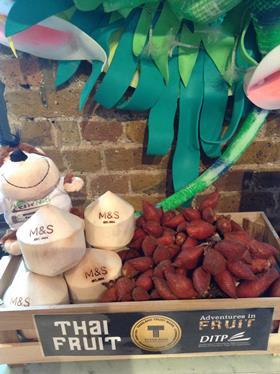
Thai fruit export volumes could be down by over 50 per cent this year compared to last due to adverse growing conditions.
Unseasonably hot, dry weather since the start of the year has cut water supplies to fruit farms in parts of the country, says Chusak Chuenprayoth, of leading exporter KC Fresh. Drought conditions continued into May in some areas, causing long-term damage to orchards, he says.
“The weather this year has very badly affected the exotic fruit crop, reducing production and quality. Export volumes will be down by more than 50 per cent,” Chuenprayoth predicts. “It has started to rain in some areas, but water supply is still a big problem and will have a long-term effect on many products.”
Many fruit growers have learnt a salient lesson from the tough conditions this year, he adds, and are now working with their local authorities on water reserve management to prevent the problem from happening again next year.
KC Fresh is managing to meet its export orders thanks to its effective farm irrigation systems and more plentiful rain at its base to the west of Thailand, says Chuenprayoth. Although its plans to offer ready-to-eat durian to the Chinese market this year have had to be put on hold due to the hot weather, which has affected fruit quality.
“Our main market is still the UK,” says Chuenprayoth. “We are still a major supplier of babycorn, green asparagus, lemongrass and herbs to major supermarkets and caterers.”
The drought and its related crop problems has come at a difficult time for the Thai produce industry, which has been the subject of negative national publicity in recent months.
A recent Bangkok Post report said that over 50 per cent of Thai-grown quality-certified fruit and vegetables sampled in the city were found to have excessive pesticide residues, including some that were branded as organic. The Thai government was also reported by the local press to have introduced export licences this year in a bid to improve the standard of exported Thai produce. Both reports are misleading, says Chuenprayoth.
“Export licences were established many years ago, and the government has a control system to monitor export products and make sure they are in line with import country requirements,” he says. “With regards to the pesticide-residue article, this information from Bangkok Post is not 100 per cent correct, and there are many arguments from all stakeholders on this issue as to why only negative results were shown in this report.
“The key issue for the Thai exotic produce industry is getting highly-skilled farmers who understand the international requirements on food safety,” he continues. “To that end, the private sector Thailand Board of Trade (BOT) established the ThaiGAP Institute in 2010 which works together with Kasetsart University (a horticultural college) to train farmers.”



